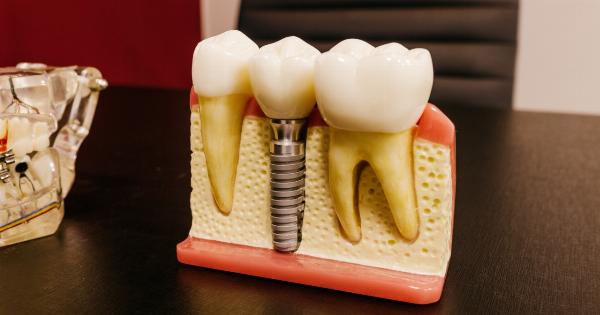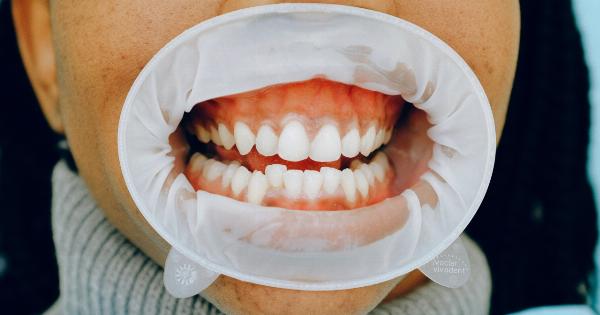Oral ulcers, also known as canker sores, are a common and painful condition that can occur inside your mouth, on your gums, or on the inner lips. These ulcers are usually round or oval-shaped with a white or yellowish center and a red border.
While the exact cause of oral ulcers is unknown, there are several factors that can contribute to their development. Understanding the potential causes can help in managing and preventing these troublesome sores.
Possible Causes of Oral Ulcers
1. Trauma: One of the most common causes of oral ulcers is trauma to the sensitive tissues inside the mouth.
Accidental biting or scratching of the inner cheeks or lips, aggressive brushing, or ill-fitting dental appliances can cause these sores to develop.
2. Stress: Emotional stress has been linked to the development of oral ulcers. Stress weakens the immune system, making it easier for the body to become susceptible to infections and other conditions, including canker sores.
3. Certain Foods: Some acidic or spicy foods can trigger the formation of oral ulcers. Consuming foods like citrus fruits, tomatoes, nuts, and chocolate may increase the likelihood of developing these sores in susceptible individuals.
4. Hormonal Changes: Fluctuations in hormone levels, particularly in women during menstruation, can contribute to the development of oral ulcers.
5. Vitamin Deficiencies: A lack of essential nutrients, such as vitamin B-12, folic acid, and iron, can lead to oral ulcer formation. These deficiencies weaken the immune system and affect the overall health of the oral tissues.
6. Inflammatory Disorders: Conditions like Crohn’s disease, Behçet’s disease, and celiac disease are associated with increased incidence of oral ulcers. These disorders cause chronic inflammation, leading to the development of painful sores.
7. Allergic Reactions: Some individuals may develop oral ulcers as a result of an allergic reaction to certain food substances or dental products like toothpaste or mouthwash.
8. Weakened Immune System: People with weakened immune systems due to certain medical conditions, chemotherapy, or HIV/AIDS are more prone to developing oral ulcers.
9. Genetic Predisposition: Some individuals may have a genetic susceptibility to developing oral ulcers. If a close family member experiences recurrent canker sores, you may have a higher risk of developing them as well.
10. Underlying Infections: In some cases, oral ulcers can be a symptom of an underlying viral or bacterial infection, such as herpes simplex virus or hand, foot, and mouth disease.
How to Get Rid of Oral Ulcers
While oral ulcers can be painful and bothersome, there are various methods to alleviate the symptoms and promote faster healing. Here are some effective remedies and treatment options:.
1. Over-the-Counter (OTC) Products
Several OTC products can provide relief from the discomfort of oral ulcers. Topical gels or ointments containing ingredients such as benzocaine, hydrogen peroxide, or licorice extract can numb the area and promote healing.
2. Saltwater Rinse
A simple and inexpensive home remedy is to rinse your mouth with warm saltwater. Mix half a teaspoon of salt in a glass of warm water and swish it around your mouth for about 30 seconds, then spit it out.
This solution helps reduce inflammation and cleanse the affected area.
3. Oral Pain Relievers
Over-the-counter pain relievers like acetaminophen or ibuprofen can help alleviate the pain associated with oral ulcers. However, consult with your doctor or pharmacist before taking any medication.
4. Avoid Trigger Foods
Identify any foods that worsen your symptoms and try to avoid them. Spicy, acidic, and salty foods can irritate the ulcers and prolong the healing process.
5. Maintain Good Oral Hygiene
Keeping your mouth clean is essential for oral ulcer healing. Gently brush your teeth with a soft-bristled toothbrush and use a mild, non-irritating toothpaste. Be cautious while brushing around the affected areas to avoid further irritation.
6. Topical Antimicrobial Medications
If you have recurrent or severe oral ulcers, your dentist or doctor may prescribe a topical antimicrobial medication to apply directly to the sores. These medications help reduce inflammation and promote healing.
7. Vitamin and Mineral Supplements
If your oral ulcers are caused by vitamin deficiencies, your healthcare provider may recommend supplements to address the imbalance. Vitamin B-12, folic acid, and iron supplements can help prevent future ulcer outbreaks.
8. Steroid Treatment
In severe cases, corticosteroid medications may be prescribed to reduce inflammation and promote healing. These medications can be in the form of topical gels, mouth rinses, or dissolvable tablets.
9. Stress Management
Since stress is a common trigger for oral ulcers, practicing stress management techniques can help prevent their occurrence. Engage in relaxation exercises, such as deep breathing, meditation, or yoga to reduce stress levels.
10. Dental Evaluation
If you experience frequent or persistent oral ulcers, it is important to consult with your dentist or healthcare provider. They can evaluate your oral health and look for any underlying conditions that may contribute to the ulcers.
Conclusion
While the exact cause of oral ulcers remains unclear, understanding the potential triggers can assist in their prevention and management.
Maintaining good oral hygiene, avoiding trigger foods, managing stress, and seeking professional advice when necessary are key steps in dealing with oral ulcers. By implementing effective remedies and preventive measures, you can minimize the discomfort and promote faster healing of these bothersome sores.



























